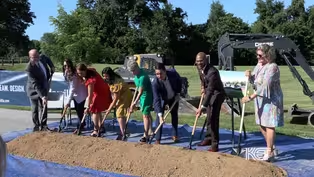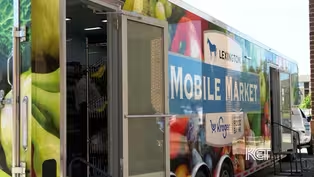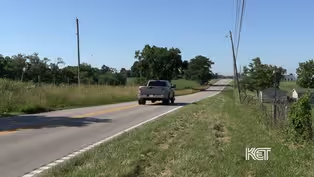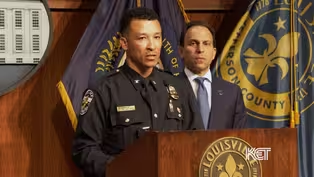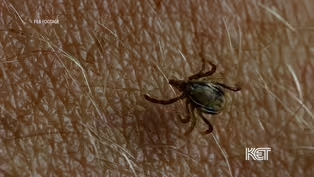
Educators From Around Kentucky Gather to Talk About Strategies to Keep Students in School
Clip: Season 3 Episode 9 | 4m 18sVideo has Closed Captions
Educators from around Kentucky gather to talk about strategies to keep students in school.
Teachers joined the Kentucky Department of Education for the Persistence to Graduation Summit, where they talked about the problems keeping kids from coming to class, how to get them reengaged in the curriculum, and ways to help them get to college.
Problems playing video? | Closed Captioning Feedback
Problems playing video? | Closed Captioning Feedback
Kentucky Edition is a local public television program presented by KET

Educators From Around Kentucky Gather to Talk About Strategies to Keep Students in School
Clip: Season 3 Episode 9 | 4m 18sVideo has Closed Captions
Teachers joined the Kentucky Department of Education for the Persistence to Graduation Summit, where they talked about the problems keeping kids from coming to class, how to get them reengaged in the curriculum, and ways to help them get to college.
Problems playing video? | Closed Captioning Feedback
How to Watch Kentucky Edition
Kentucky Edition is available to stream on pbs.org and the free PBS App, available on iPhone, Apple TV, Android TV, Android smartphones, Amazon Fire TV, Amazon Fire Tablet, Roku, Samsung Smart TV, and Vizio.
Providing Support for PBS.org
Learn Moreabout PBS online sponsorship10% of Kentucky students aren't able to graduate in four years, and the dropout rate is at 2% for grades four through 12.
Teachers from around Kentucky joined the Kentucky Department of Education for the Persistence to Graduation Summit, where they talked about the problems keeping kids from come in class and how to get them reengaged in the curriculum and ways to help them get to college.
We have students who miss a lot of instruction because there is chronically exit.
But then why are they chronically absent?
Then we have to get to the root of that.
And sometimes it's just a lack of engagement and sometimes it's a lack of family support.
There's a lot of different kinds of barriers, and they don't just start in high school.
They start in the early years as well and can be cumulative.
We have some different dynamics that are play where students might be pushed out, pull out or what we call falling out, where, you know, students might experience some challenging behaviors in school and might be suspended or expelled, which would kind of push them out of the school some that sometimes they might be pulled out because they have different life circumstances that might pull them away from school, whether it's family instability or, you know, housing instability, financial instability, that kind of thing, where they might leave hold out in order to work or do something to help support their family.
We also have instances where students fall out and they just become disengaged.
They might be experiencing some bullying or other circumstances at school that make them feel not connected.
We definitely see larger numbers of students who are living in poverty.
Students of color, other students who are maybe underserved or at risk in our community, or having the highest rates of dropout.
You got to have something to offer them.
Just saying to them, Go back to class and do your best without any kind of intervention or without any kind of possibly alternative scheduling or mental health services.
That's not going to get them to where you need them to be.
I believe that education is the pivoting point for a lot of people with disparities and with not as much support in their upbringing and in their home life.
And so if we do not give them that pathway of success and opportunity, then who will?
And I think that's really important for us to remember and to keep in the forefront of our mind.
Some of the more successful strategies are really helping to build those relationships with students that will help keep them engaged in school, whether that is an a significant relationship with an adult in the building and making sure that their every student feels like they have an adult in the building who cares about them and can follow up with them if they don't show up.
One day and might need some additional support.
Or engaging the peers that they have in the school, particularly through the sources of strength model and other peer led initiatives where the students can help check in with one another and provide peer mentoring or other other points of connection so that the students will feel engaged in school.
Something that really worked for me is my high school prioritized putting.
I would say a blanket of love and support around me.
I don't think it was a formalized program, but they seem a need and me and they made it happen.
Now that same school has mentoring programs, peer to peer groups, and that was not there even ten years ago.
So there's progress right there.
Now they're able to talk to people who come from where they come from.
They're seen, they're heard, and then they still have that adult love and support from the faculty and the staff.
And that really makes a difference because it made a difference for me.
At the summit, a youth panel of former and current Kentucky students talked about ways to gain trust with students and how to help foster kids both in and out of school.
This was the first time the summit included a student panel since 2016.
Jefferson County Public Schools Breaks Ground on New Early Childhood Center
Video has Closed Captions
Clip: S3 Ep9 | 3m 6s | Jefferson County Public Schools breaks ground on new early childhood center. (3m 6s)
Mobile Market Bringing Food to Areas with Few Grocery Stores Doubles Sales in Six Months
Video has Closed Captions
Clip: S3 Ep9 | 2m 44s | Mobile market bringing food to areas with few grocery stores doubles sales in six months. (2m 44s)
Montgomery County Receives $2 Million Check for New 163-acre Industrial Park
Video has Closed Captions
Clip: S3 Ep9 | 2m 7s | Montgomery County receives $2 million check for new 163-acre industrial park. (2m 7s)
Next Steps for Louisville Metro Police Department after Police Chief’s Suspension
Video has Closed Captions
Clip: S3 Ep9 | 2m 55s | Next steps for Louisville Metro Police Department after police chief’s suspension. (2m 55s)
UofL Medical Expert Talks Ticks and What to Do If You Are Bitten By One
Video has Closed Captions
Clip: S3 Ep9 | 2m 31s | UofL medical expert talks ticks and what to do if you are bitten by one. (2m 31s)
Providing Support for PBS.org
Learn Moreabout PBS online sponsorship
- News and Public Affairs

Top journalists deliver compelling original analysis of the hour's headlines.

- News and Public Affairs

FRONTLINE is investigative journalism that questions, explains and changes our world.












Support for PBS provided by:
Kentucky Edition is a local public television program presented by KET
